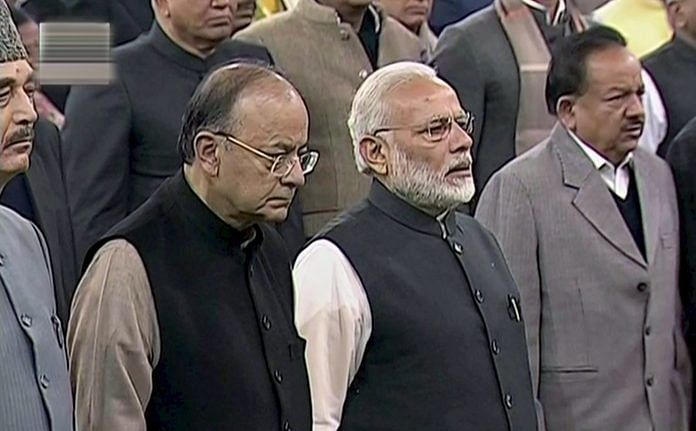The business community is hungry for clarity on the new set of significant economic reforms the Modi government plans to tackle.
On 1 February, Arun Jaitley will release his fifth Budget as finance minister. Expectations over what the Budget can accomplish as a “reform tool” are gradually becoming more realistic — a long overdue shift. Specific budgetary measures are expected to shore up the BJP’s rural vote base ahead of the 2019 Lok Sabha election.
However, the accompanying Budget speech holds particular significance for the business community this year. The Narendra Modi government’s list of tangible policy reforms — so evident early in its tenure — is wearing thin due to a mixture of successful implementation in some cases, and impenetrable roadblocks in others. The business community needs more clarity on what’s next.
In the early 1990s, the release of the Union Budget was a veritable carnival for India’s reform-watchers. Reductions in India’s customs duties would bring new goods to the market. Altering the massive tax slabs would make products affordable. Reforms articulated by the finance minister in the Budget speech would be groundbreaking — even if they had to be announced in a few successive Budgets before they were introduced.
The Budget’s relevance as India’s core reform document has lost a great deal of importance over the last 27 years. The Vajpayee government, in an attempt to avoid wild stock market swings on Budget day, started to announce foreign direct investment (FDI) reforms just ahead of the Budget’s release — a trick the Modi government pulled this year with some modest foreign investment reforms in mid-January. Last year, Jaitley outlined a few progressive reforms relevant to foreign investors, including phasing out the Foreign Investment Promotion Board (FIPB), and parliamentary approval of a bill to facilitate the dissolution of bankrupt financial firms. The former has happened; the latter is still pending.
Ahead of national elections, the BJP government will likely try to squeeze out some additional spending for targeted constituencies, particularly farmers and rural citizens. This could potentially include revisiting an oft-used initiative to forgive farmers’ loans, or tweaking the Mahatma Gandhi National Rural Employment Guarantee Act (MGNREGA).
Foreign firms, if anything, hope to see the government use the Budget to enact reductions in customs duties in those sectors where India’s duty rates remain relatively high, including honoring commitments to zero customs duties in sectors covered by the World Trade Organisation’s Information Technology Agreement. Foreign firms also hope to not be targeted with increased customs duties on heavily-traded products, or some type of new revenue grab, akin to the 2012 Income Tax Act amendment that made domestic law override India’s treaty.
This year, however, both foreign and domestic firms will track the Budget speech quite closely. But, the Budget speech tends to be misunderstood. Many casual observers believe that a reform articulated by the finance minister is part of the Budget — which is often not the case, leading to a certain amount of confusion. As this realisation has set in, and some promised reforms never come to fruition, the Budget speech’s importance has waned.
However, this year, the Budget speech itself will hold a high degree of significance. Many of the priority reforms articulated by the Modi government early in its tenure have been carried out. This includes key reforms like introducing the Goods and Services Tax, amending the Insurance Act, ending “tax terrorism”, bankruptcy reform, and enacting a new regulatory regime for the oil and gas sector.
Other planned reforms have hit firm roadblocks, and appear unlikely to move. The status quo is expected to continue at least until the BJP secures a higher seat count in the Rajya Sabha. These stalled reform sectors include easing India’s onerous labour regulations, and facilitating land acquisition.
The business community is hungry for clarity on the new set of significant economic reforms the Modi government plans to tackle, particularly as it expands its footprint in the Rajya Sabha and among state governments. There are a series of important economic bills currently pending, such as the Major Ports Authority bill, the Financial Resolution and Deposit bill, the Merchant Shipping bill, and others. Nevertheless, there are key non-legislative steps the government can take as well, such as outlining the plan to further liberalise India’s foreign equity restrictions, further strengthening cross-border taxation oversight, and cutting through the morass of permits and approvals required to start and operate a business.
It has taken a few years for reality to match expectations, in terms of what the Budget can accomplish. With a national election looming, the scope for tectonic reforms in the Budget may be limited — except if they pertain to rural voters. But the Budget speech could be the star of the show if Jaitley can outline specific reforms the government wants to initiate, as he did in his earlier Budgets.
The Modi government has mastered the art of marketing its agenda, and it now needs to apply this effort to a renewed reform agenda to maintain investor interest.
Richard M. Rossow is senior advisor and Wadhwani Chair in US-India Policy Studies, Center for Strategic & International Studies, Washington DC.



